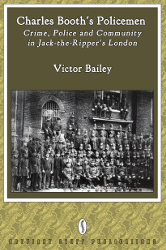The recorded crime rate in the East End of London fell during the period of 1875 until 1900. The rate of common assaults, aggravated assaults, and assaults on the police fell from 423 crimes per 100,000 people in 1875 to 204 crimes in 1900 and even prosecutions for drunkenness fell after 1875.
The purpose of this book is to show clearly how that decline was directly related to the actual behavior of the public rather than changes in law enforcement or people’s attitude to crime.
In the later nineteenth century the East End of London had become notorious as a place of extreme poverty, crime and immorality. It was home to a huge diversity of population including many immigrant Irish, Jewish, Chinese, Lascars, Japanese and Indians, these various groups settling into their own particular areas. Drunkenness, prostitution and gambling was rife in all these districts but self-regulation in these ethnic communities kept the crime rate figures down.
One example is how the east end Jewish quarter was internally ‘policed’ by their own group using their capacity to organize collectively, and guided by a set of values and beliefs. Although the members of the London police force felt perfectly safe when patrolling this area they were not really aware of all that might be happening. Their main disadvantage being that no one in the force spoke Yiddish, Russian or Polish! Other boroughs were not so easy to patrol, such as the Irish community in Shadwell and Bethnal Green but nevertheless, although regarded by the police with great suspicion, the self-regulation of these communities continued with their own strict codes of behavior.
As the author points out ‘the police were not the prime movers in the control of deviant behavior. They worked at the margins’ …..’ Order was cemented less by policing than by a complex combination of informal family and community sanctions’
